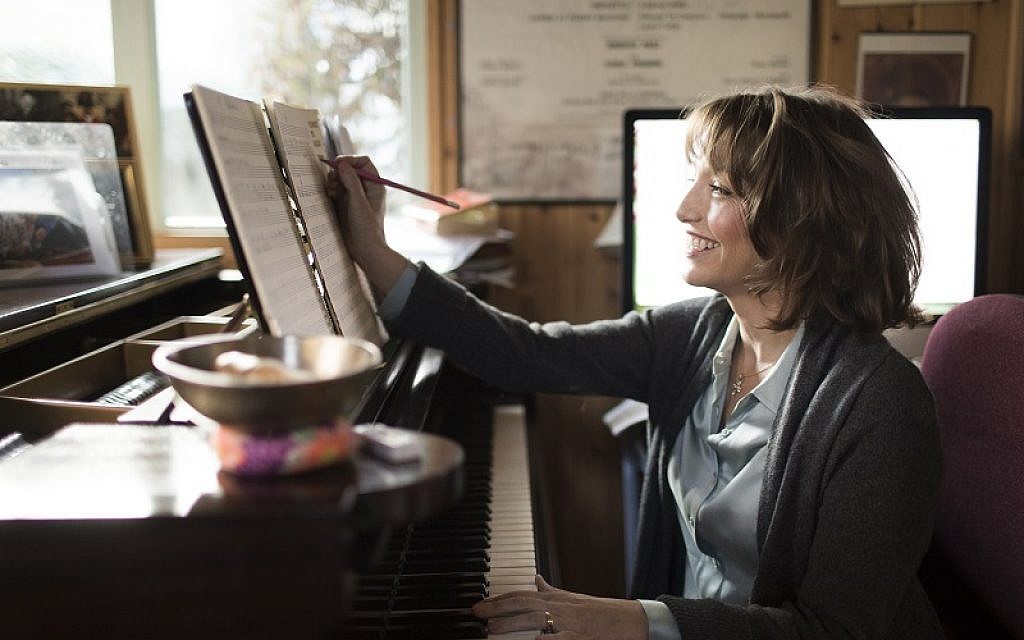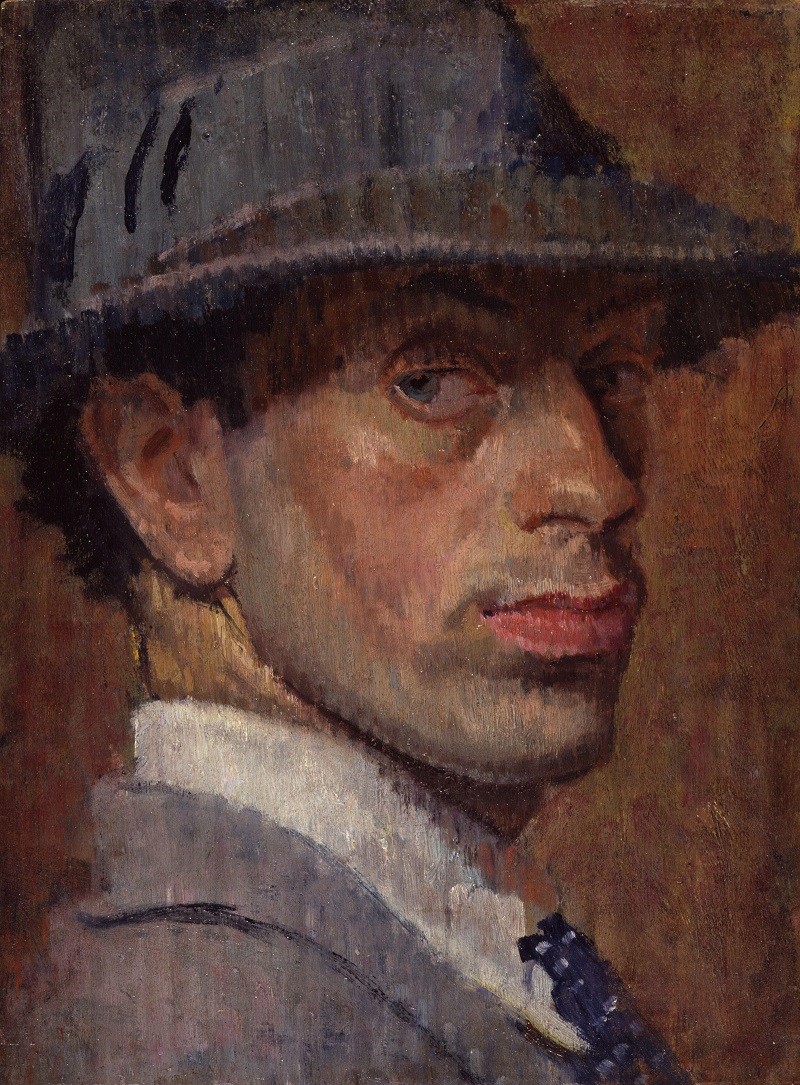BBC Proms composer Roxanna Panufnik inspired by Jewish poet
First World War poetry by Isaac Rosenberg features in commissioned piece Songs of Darkness, Dreams of Light

“I have lived in the underworld so long”, wrote Jewish poet Isaac Rosenberg. “How can you, a creature of light, without terror understand the song and unmoved hear what moves in night.”
In a later verse, the flourishing artist whose life was tragically cut short at 27 and is remembered for his poignant First World War poetry, refers to the “terrible darkness” and “breathing breath impure”.
Written five years before the outbreak of war, In The Underworld actually refers to living with a broken heart, but presents an eerie prediction of the appalling conditions soldiers would face in the trenches.
Get The Jewish News Daily Edition by email and never miss our top stories Free Sign Up
Such is its relevance more than 100 years on, that composer Roxanna Panufnik has placed the poem front and centre for her latest major work, Songs of Darkness, Dreams of Light, which premieres at the Last Night of the Proms this weekend.
Panufnik, the daughter of the late Polish composer and conductor, Sir Andrzej Panufnik, and Jewish photographer Camilla Jessel, reveals she wanted to “shout it from the rooftops” when she received the much-coveted BBC commission.
The concept was to come up with a piece commemorating 100 years since the end of the First World War, scored for two choirs and an orchestra.
Panufnik, who turned 50 this year and has a keen interest in world music, tells me: “They wanted me to write for the BBC Singers, a crack chamber choir of the most amazing professional singers and also the BBC Symphony Chorus, 114 fabulous amateur singers, as well as the BBC Symphony Orchestra, conducted by Sir Andrew Davis.
“While it commemorates the centenary of the end of the First World War, at the same time it looks optimistically and happily into the future.”
She admits feeling the task was “quite a challenge”, but was given a starting point after being sent “this amazing Rosenberg poem” by a former teacher.
The composer, who lives in London with her husband and their three children, confesses: “I had never heard of Rosenberg before, but it’s such an amazing poem. I didn’t know the background to it.
“I just thought instantly that it’s such an amazing depiction of life in the trenches and only discovered afterwards that it was about unrequited love.”
To offset the poem, performed by the BBC Singers, Panufnik selected lines from Kahlil Gibran’s The Prophet for the BBC Symphony Chorus.
The two independent pieces work together as a “conversation” between the two choirs.
She explains: “I found these lines that seemed to soothe and comfort the fears in the Rosenberg poem. The Gibran poem finishes, ‘We can build another tower in the sky’, so it all ends optimistically and almost like saying, whatever happens, we can rebuild.”
After choosing the two pieces, Panufnik set about writing the music, reflecting the backgrounds of each poet.
“For the Rosenberg, I’ve used a really beautiful Ashkenazi prayer mode, and for the Gibran I’ve used this Maronite Syriac chant. They both come from the same Middle Eastern sound world, so that worked very well together.”
Her composition also reflects Gibran’s later interest in Islam, using the structure of a zikr, a prayer chant that starts slow and quiet, before building up to a “faster and brighter conclusion”.

As someone who has long held an interest in music from different faiths and cultures, Panufnik – who is a practising Catholic – reveals she has “always felt an affinity with Jewish music” and feels “very strongly” about her Jewish identity.
“I’ve always loved Jewish music,” she says. “And I definitely feel my Jewish roots, as much as I feel my Polish Catholic father’s roots. I’m a Catholic, but in my heart and soul I do feel my Jewish roots very strongly.”
Her Jewishness, she says, has influenced her music as much as her late father who, having been a victim of Nazi censorship and the Polish communist dictatorship, arrived as a political refugee in England, in 1954.
She says of her choice to follow in his footsteps: “It was in my DNA. I was brought up with music around me all the time, so it was like there was never going to be anything else.
“I tried and discarded so many things during my childhood. In the end, it became quite clear the only thing I was any good at was composing and he was incredibly supportive of that.
“I still feel his presence very clearly. In my composing shed, I have his grand piano that he composed on, his light fittings, writing desk and baton. I feel whatever I am doing is getting to him.”
Looking to her premiere, Panufnik reveals she will be sitting in the audience, among the “real party atmosphere” of the Last Night of the Proms. “It’s incredibly exciting. The Last Night of the Proms really is like every composer’s dream come true.”
Songs of Darkness, Dreams of Light premieres at the Last Night of the Proms on Saturday, 7.15pm, BBC2
- FULL Jewish News interview with John McDonnell: ‘MPs shouldn’t face deselection’
- Listen to the full interview with John McDonnell here:

Thank you for helping to make Jewish News the leading source of news and opinion for the UK Jewish community. Today we're asking for your invaluable help to continue putting our community first in everything we do.
For as little as £5 a month you can help sustain the vital work we do in celebrating and standing up for Jewish life in Britain.
Jewish News holds our community together and keeps us connected. Like a synagogue, it’s where people turn to feel part of something bigger. It also proudly shows the rest of Britain the vibrancy and rich culture of modern Jewish life.
You can make a quick and easy one-off or monthly contribution of £5, £10, £20 or any other sum you’re comfortable with.
100% of your donation will help us continue celebrating our community, in all its dynamic diversity...
Engaging
Being a community platform means so much more than producing a newspaper and website. One of our proudest roles is media partnering with our invaluable charities to amplify the outstanding work they do to help us all.
Celebrating
There’s no shortage of oys in the world but Jewish News takes every opportunity to celebrate the joys too, through projects like Night of Heroes, 40 Under 40 and other compelling countdowns that make the community kvell with pride.
Pioneering
In the first collaboration between media outlets from different faiths, Jewish News worked with British Muslim TV and Church Times to produce a list of young activists leading the way on interfaith understanding.
Campaigning
Royal Mail issued a stamp honouring Holocaust hero Sir Nicholas Winton after a Jewish News campaign attracted more than 100,000 backers. Jewish Newsalso produces special editions of the paper highlighting pressing issues including mental health and Holocaust remembrance.
Easy access
In an age when news is readily accessible, Jewish News provides high-quality content free online and offline, removing any financial barriers to connecting people.
Voice of our community to wider society
The Jewish News team regularly appears on TV, radio and on the pages of the national press to comment on stories about the Jewish community. Easy access to the paper on the streets of London also means Jewish News provides an invaluable window into the community for the country at large.
We hope you agree all this is worth preserving.
-
By Brigit Grant
-
By Laurent Vaughan - Senior Associate (Bishop & Sewell Solicitors)
-
By Laurent Vaughan - Senior Associate (Bishop & Sewell Solicitors)
-
By Laurent Vaughan - Senior Associate (Bishop & Sewell Solicitors)
-
By Laurent Vaughan - Senior Associate (Bishop & Sewell Solicitors)





















